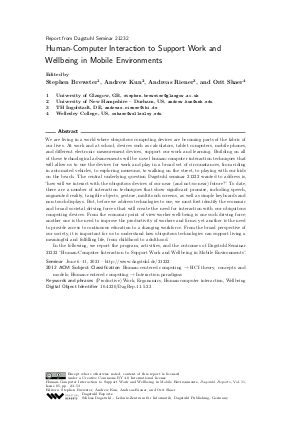Human-Computer Interaction to Support Work and Wellbeing in Mobile Environments (Dagstuhl Seminar 21232)
Authors Stephen Brewster, Andrew Kun, Andreas Riener, Orit Shaer and all authors of the abstracts in this report
-
Part of:
Issue:
Dagstuhl Reports, Volume 11, Issue 5
Part of: Volume: Dagstuhl Reports, Volume 11
Part of: Journal: Dagstuhl Reports (DagRep) - License:
 Creative Commons Attribution 4.0 International license
Creative Commons Attribution 4.0 International license
- Publication Date: 2021-12-01
File

PDF
DagRep.11.5.23.pdf
- Filesize: 8.85 MB
- 31 pages
Document Identifiers
Subject Classification
ACM Subject Classification
- Human-centered computing → HCI theory, concepts and models
- Human-centered computing → Interaction paradigms
Keywords
- (Productive) Work
- Ergonomics
- Human-computer interaction
- Wellbeing
Metrics
- Access Statistics
-
Total Accesses (updated on a weekly basis)
0Document
0Metadata
Abstract
We are living in a world where ubiquitous computing devices are becoming parts of the fabric of our lives. At work and at school, devices such as calculators, tablet computers, mobile phones, and different electronic measurement devices, support our work and learning. Building on all of these technological advancements will be novel human-computer interaction techniques that will allow us to use the devices for work and play in a broad set of circumstances, from riding in automated vehicles, to exploring museums, to walking on the street, to playing with our kids on the beach. The central underlying question Dagstuhl seminar 21232 wanted to address is, "how will we interact with the ubiquitous devices of our near (and not-so-near) future?" To date, there are a number of interaction techniques that show significant promise, including speech, augmented reality, tangible objects, gesture, multitouch screens, as well as simple keyboards and non-touch displays. But, before we address technologies to use, we must first identify the economic and broad societal driving forces that will create the need for interaction with our ubiquitous computing devices. From the economic point of view worker well-being is one such driving force; another one is the need to improve the productivity of workers and firms; yet another is the need to provide access to continuous education to a changing workforce. From the broad perspective of our society, it is important for us to understand how ubiquitous technologies can support living a meaningful and fulfilling life, from childhood to adulthood. In the following, we report the program, activities, and the outcomes of Dagstuhl Seminar 21232 "Human-Computer Interaction to Support Work and Wellbeing in Mobile Environments".
Cite As Get BibTex
Stephen Brewster, Andrew Kun, Andreas Riener, and Orit Shaer. Human-Computer Interaction to Support Work and Wellbeing in Mobile Environments (Dagstuhl Seminar 21232). In Dagstuhl Reports, Volume 11, Issue 5, pp. 23-53, Schloss Dagstuhl – Leibniz-Zentrum für Informatik (2021)
https://doi.org/10.4230/DagRep.11.5.23
BibTex
@Article{brewster_et_al:DagRep.11.5.23,
author = {Brewster, Stephen and Kun, Andrew and Riener, Andreas and Shaer, Orit},
title = {{Human-Computer Interaction to Support Work and Wellbeing in Mobile Environments (Dagstuhl Seminar 21232)}},
pages = {23--53},
journal = {Dagstuhl Reports},
ISSN = {2192-5283},
year = {2021},
volume = {11},
number = {5},
editor = {Brewster, Stephen and Kun, Andrew and Riener, Andreas and Shaer, Orit},
publisher = {Schloss Dagstuhl -- Leibniz-Zentrum f{\"u}r Informatik},
address = {Dagstuhl, Germany},
URL = {https://drops.dagstuhl.de/entities/document/10.4230/DagRep.11.5.23},
URN = {urn:nbn:de:0030-drops-155693},
doi = {10.4230/DagRep.11.5.23},
annote = {Keywords: (Productive) Work, Ergonomics, Human-computer interaction, Wellbeing}
}
